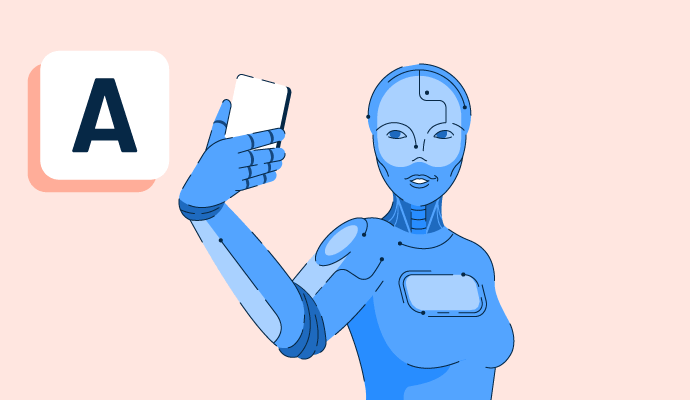What is artificial general intelligence (AGI)?
Artificial intelligence can be classified into various types, each with unique features and capabilities. One type is artificial general intelligence (AGI), which aims to replicate human cognitive abilities in software and perform any task a human can.
AGI possesses sensory perception and motor skills, allowing it to learn from experiences similar to humans. It can understand concepts, reason, solve problems, and complete complex tasks without human assistance.
AGI is often depicted in science fiction movies like Westworld or Star Trek, showcasing its potential to revolutionize industries and tackle challenging problems in healthcare, agriculture, and space exploration.
However, developing AGI is a significant technological challenge that requires significant advancements. While current artificial intelligence solutions or narrow AI technology has not yet reached the level of AGI, developers are actively working towards making it a real world reality.
Examples of artificial general intelligence
AGI systems are not currently available on the market. However, some examples of AI systems demonstrate impressive capabilities in specific areas. Here are some examples of advanced AI systems:
- IBM's Watson. Watson is a supercomputer that leverages immense computing power and AI algorithms to tackle complex science and engineering tasks that surpass the capabilities of an average computer. For instance, Watson has been used to model the Big Bang theory and study the human brain.
- Expert systems. These AI-based systems mimic human judgment and can provide recommendations based on patient data in healthcare or predict molecular structures in chemistry and biology.
- Self-driving cars. Autonomous vehicles employ AI to recognize and navigate road conditions, including identifying vehicles, pedestrians, and objects. Although self-driving cars require human intervention in ambiguous situations, significant progress has been made towards Level 5 automation, where vehicles can operate intuitively without human intervention.
- Language models. Neural networks like ChatGPT (GPT-3 and GPT-4) by OpenAI and other language learning models (LLMs) analyze vast amounts of data to generate text and images. While they work on principles of reinforcement learning and cannot think independently, they represent a significant step towards AGI, demonstrating the ability to process language in a human-like manner.
- ROSS Intelligence. ROSS is an AI-based legal expert system that can analyze vast legal documents and respond precisely to complex legal questions in seconds.
- AlphaGo. AlphaGo is a computer program that has mastered the complex board game Go, defeating the world champion in 2016. It showcases narrow intelligence excelling at specific problem-solving domains.
- Music AIs. Algorithms like Dadabots can generate music approximations given a dataset of existing music, demonstrating AI's potential in creative domains.
- Sophia the Robot. Sophia, a social humanoid robot, utilizes AI technologies, including AGI-like reasoning systems, to imitate human gestures and facial expressions and engage in conversations.
Artificial general Intelligence features
While AGI is an area of ongoing research and development, several key features can significantly define its capabilities. Here is a list of features worth highlighting:
- Abstract thinking. AGI will be able to understand and reason with hypothetical ideas, thoughts, and abstract concepts, going beyond simple data processing.
- Background knowledge. AGI will have access to vast amounts of data on various topics, enabling it to quickly gather information and leverage comprehensive knowledge in its decision-making process.
- Cause and effect. AGI will understand the cause-and-effect relationships between actions and their consequences, allowing it to make informed decisions based on anticipated outcomes.
- Common sense. Unlike today's AI systems, AGI will have developed common sense, enabling it to apply logical reasoning and practical judgment in various situations, making more contextually appropriate decisions.
- Transfer learning. AGI will excel at transferring knowledge and skills learned from one task to similar tasks, facilitating rapid adaptation and learning in new domains.
Artificial general intelligence capabilities
In theory, AGI has the potential to perform any task that humans can and even surpass human capabilities.
If AGI becomes a reality, intelligent machines will be able to do everything humans can. By combining the flexible thinking and reasoning skills of humans with the computational power of machines and deep learning, AGI could excel in tasks requiring quick calculations and complex problem-solving.
AGI-based systems could revolutionize fields such as surgery, medical diagnosis, and transportation by consistently delivering higher-quality results, ultimately saving time, money, and lives.
However, the invention of AGI also raises concerns about societal disruptions. As AGI gradually takes over human tasks, there is a potential for increased unemployment and poverty unless prior planning is done.
While there are numerous possibilities once AGI is realized, the current state of AGI is still far from actuality. The discussions surrounding AGI largely remain in the realm of fiction and speculation.
Applications of artificial general intelligence
Here's a list of some industries that can benefit from the implementation of AGI:
- Agriculture. AGI can optimize planting strategies, irrigation systems, and fertilizer application, increasing crop yield and reducing wastage.
- Education and training. AGI-based intelligent learning systems can create personalized learning plans tailored to individual students, enhancing the educational experience.
- Finance. AGI can automate financial analysis, trading, risk management, and make predictions in the market, enabling more efficient and informed decision-making.
- Healthcare. AGI can assist with diagnostics, treatment plans, and surgical procedures and contribute to drug development, improving patient outcomes and advancing medical research.
- Manufacturing. AGI can enhance the speed and precision of complex and repetitive tasks, reducing waste, increasing productivity, and improving overall efficiency in the manufacturing process.
- Military and defence. AGI can be applied to enhance surveillance, develop real-time strategies, and improve combat systems, bolstering military operations and national security.
- Retail. AGI can optimize tasks such as inventory management, personalized recommendations, and customer service, improving the quality of service while minimizing costs.
- Space exploration. AGI can play a crucial role in operating autonomous systems for space exploration and research. It can analyze data from space missions, uncover insights, and contribute to scientific discoveries.
- Transportation. AGI has the potential to revolutionize transportation through autonomous vehicles. AGI-powered vehicles can enhance efficiency and sustainability by improving traffic management, reducing accidents, and optimizing transportation costs.
Benefits of artificial general intelligence
AI technology is advancing rapidly, and while AGI is not yet available, its arrival will bring about transformative changes.
Unlike AI models requiring continuous human supervision and input, AGI can perform tasks without constant intervention. This will lighten the workload for many jobs and make them more accessible and efficient.
AGI possesses powerful computational processing capabilities, flexible thinking, and advanced reasoning abilities. These characteristics are expected to revolutionize sectors such as healthcare and education, especially in rural areas where resources are scarce. Furthermore, AGI's scope extends beyond these domains, offering solutions to pressing global issues like illness, hunger, and political instability.
Risks of artificial general intelligence
While artificial general intelligence (AGI) holds great potential, it also presents risks and challenges.
AGI, like AI, can make errors, especially when trained on biased data, potentially leading to erroneous or discriminatory decisions. Defining the boundaries of AGI's capabilities is essential to avoid negative consequences and promote responsible use. AGI could pose a threat without proper ethics and control, potentially becoming a weapon in the wrong hands.
Achieving human-level-ai intelligence in AGI requires understanding and replicating various aspects of human thinking, including logical reasoning, intuitive knowledge, emotions, sensory perception, and motor skills. Mastering these components is a significant challenge.
Future of artificial general intelligence
AI is already a reality of the 21st century. It is advancing with realistic synthetic media such as images and improved speech recognition in noisy environments. However, achieving general-purpose, human-level AI is still expected to take several decades.
AGI has the potential to revolutionize industries by automating tasks beyond human capabilities. However, it also raises concerns about the impact on jobs and society.
Scientists and AI researchers believe that once AGI achieves self-improvement, it could evolve into artificial superintelligence, surpassing human control.
Renowned physicist Stephen Hawking warned about the risks associated with AGI. While some AI experts remain sceptical about AGI's feasibility and desirability, recent advancements in generative AI, such as ChatGPT and image generation systems, have showcased AI's capabilities and demonstrated the potential of AI technology in various applications.
Artificial intelligence vs. artificial general intelligence
While AI and AGI may sound similar, they are different concepts—one relevant to the present and the other pertaining to the future.
.png)
Artificial intelligence is a computer system that imitates human intelligence. It can perform tasks like recognizing speech, making decisions, and translating languages. It uses technologies like machine learning and natural language processing. Examples of AI include voice assistants, AI chatbots, and facial recognition systems.
Artificial general intelligence represents a significant advancement in AI technology. AGI can perform any intellectual task that a human being can. It can reason, plan, learn, understand natural language, and solve problems like humans. AGI operates autonomously without constant human supervision, and its performance can match or surpass human capabilities.
Learn more about the captivating history of AI, tracing its remarkable journey to the present day.

Devyani Mehta
Devyani Mehta is a content marketing specialist at G2. She has worked with several SaaS startups in India, which has helped her gain diverse industry experience. At G2, she shares her insights on complex cybersecurity concepts like web application firewalls, RASP, and SSPM. Outside work, she enjoys traveling, cafe hopping, and volunteering in the education sector. Connect with her on LinkedIn.

